A Kadhi recipe that is a family heirloom recipe and tastes super delicious. This fabulous Kadhi Pakora is my mother-in-law’s treasured recipe of making the traditional Punjabi Kadhi with onion pakora. Here the crispy onion fritters are dunked in a spiced, savory, tangy yogurt sauce. A recipe she has been making for ages and loved by all of us.
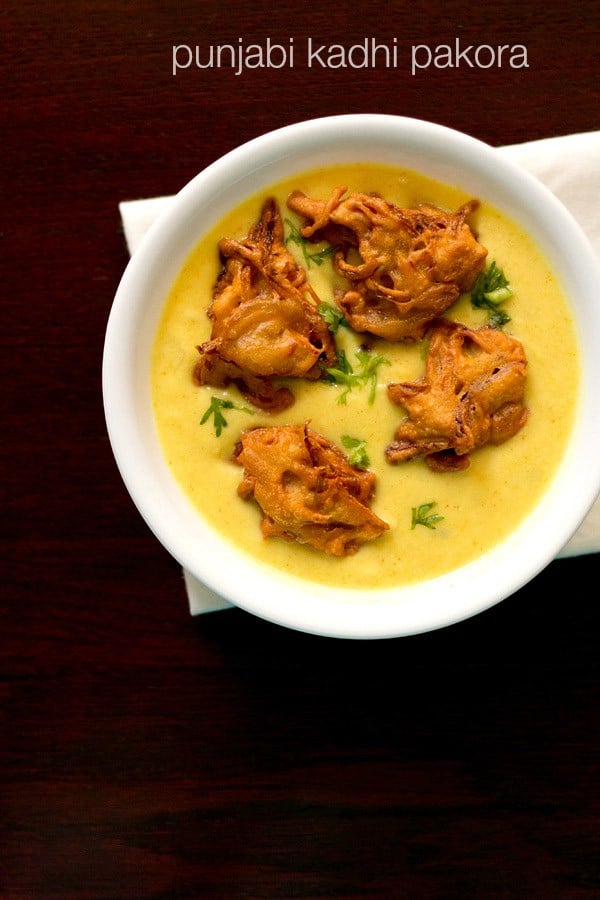
About Kadhi Recipe
The Hindi word “Kadhi” denotes a yogurt sauce that has been slow-cooked for quite some time. The word “pakora” means fritters made from gram flour (besan). In this recipe, the fritters are made with savory, spiced batter made with onions, gram flour and seasonings.
There are many variations of making kadhi in North and Western Indian cuisines. Even though the spices or herbs added are different, but the yogurt sauce is mostly thickened with gram flour (called besan in Hindi).
Gram flour is made from skinned black chickpeas and has a nutty flavor. The curd that is used to make kadhi is sour curd. As a result, this dish has a sour, spiced and creamy taste.
You will find that each state and region have their own ways of making dahi besan kadhi. So we have Maharashtrian Kadhi, Rajasthani Kadhi, Gujarati Kadhi, Sindhi Kadhi and so on.
The Punjabi Kadhi is different from the other regional variations of kadhi. It is thicker and creamier than other variations which have a slightly thinner consistency.
The herbs and spices used in the recipe are also different. The onion pakora offers a lot of texture and balances the creaminess of the yogurt sauce.
I often make Kadhi pakora, but I just could not manage to take step-by-step photos and that is why it took me so long to share this delicious Punjabi kadhi recipe.
We love kadhi, be it with or without pakora. When we serve Punjabi kadhi pakora with steamed rice or jeera rice, we call it kadhi chawal – where chawal is the Hindi word for rice.
You can also have kadhi with roti but we prefer to have it with rice. Kadhi Chawal and Rajma Chawal are a staple and much-loved food in Punjabi homes.
How to make Kadhi Pakora
This is again one of those recipe posts, where there are maximum pictures. Since I am presenting a step-by-step photo guide, I will first begin with making the curd slurry, then making the onion pakora and then finally with the making of the kadhi pakora.
Make Curd Slurry
1. In a bowl take 1.5 cups sour curd or about 375 grams of curd. Whisk it well till smooth.
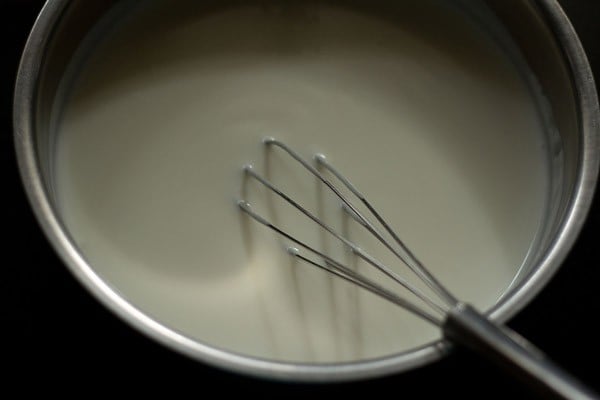
2. Add 8 tablespoons of gram flour (besan), ½ teaspoon red chilli powder, ½ teaspoon turmeric powder, ½ teaspoon garam masala powder and 1 teaspoon salt to the whisked curd.
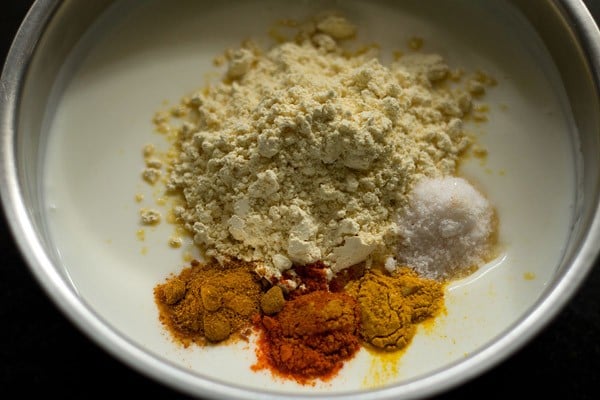
3. Stir and mix everything again.
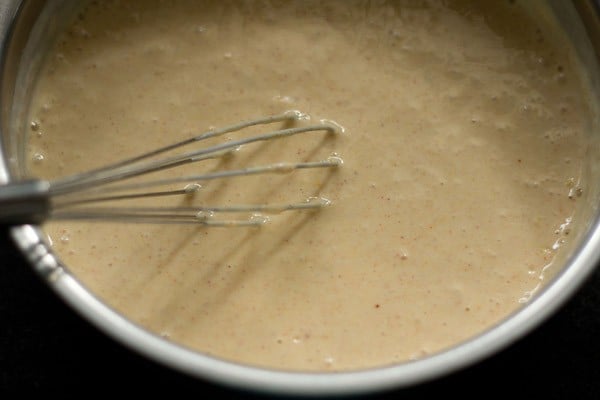
4. Add 3 cups water and stir again.
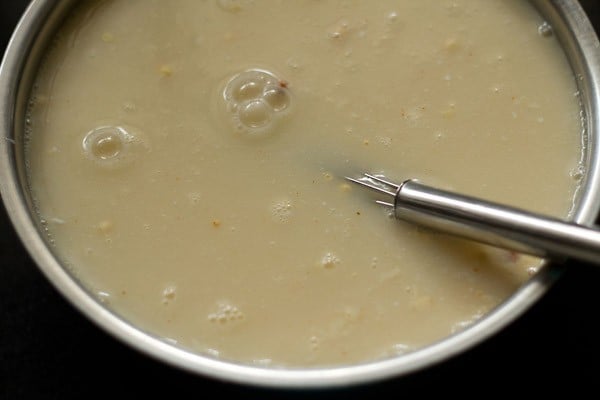
5. Stir very well to make a smooth mixture without lumps. If there are lumps, then break them with a wired whisk or a spatula or with your fingers. Set the curd slurry aside.
You can use a blender to make this mixture, but make sure you don’t over do it. You will get butter instead of a smooth blended curd.
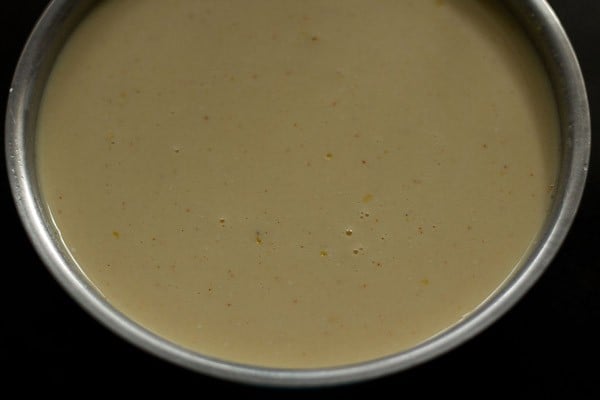
Make Pakora For Kadhi
1. Take 1 cup gram flour (besan) in a bowl and add the following ingredients:
- ½ teaspoon ajwain (carom seeds)
- ½ teaspoon red chili powder or cayenne pepper
- ½ teaspoon garam masala powder
- ⅔ teaspoon salt or as required
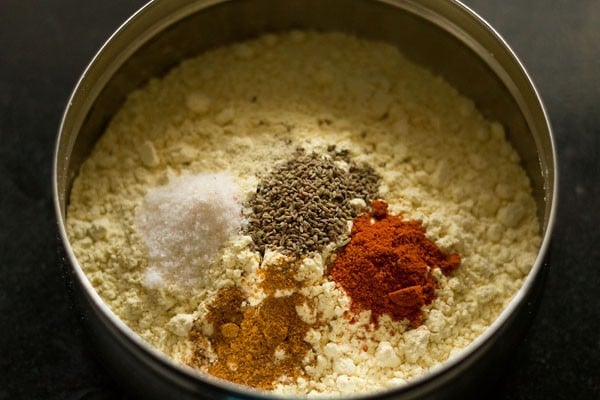
2. Add 1 cup thinly sliced onions. About 2 medium to large onions, sliced, approx 150 grams of onions.
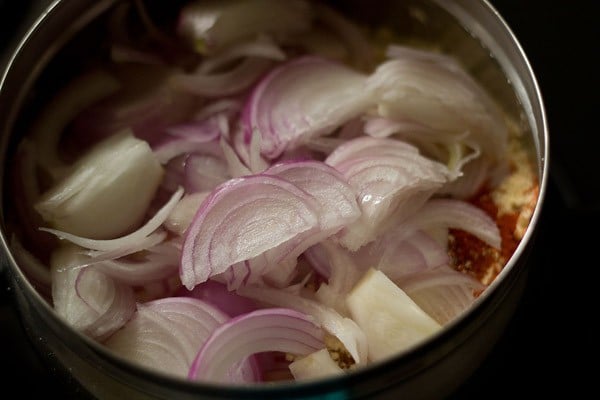
3. Mix everything well and keep aside covered for 30 minutes.
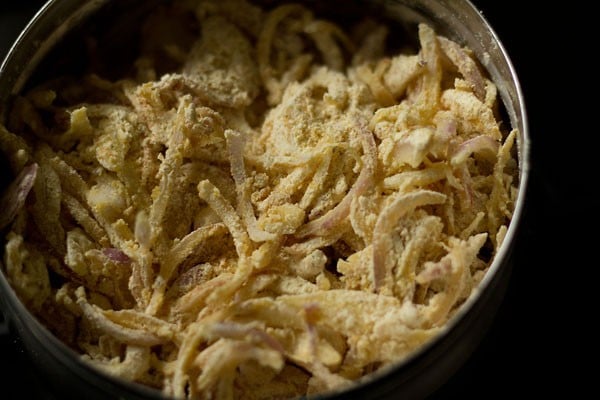
4. This will allow the onions to release their water in the mixture. Depending on the water content in the onions, the mixture will become very moist or just about moist. Here’s a photo of the onions after 30 minutes. Mix again.
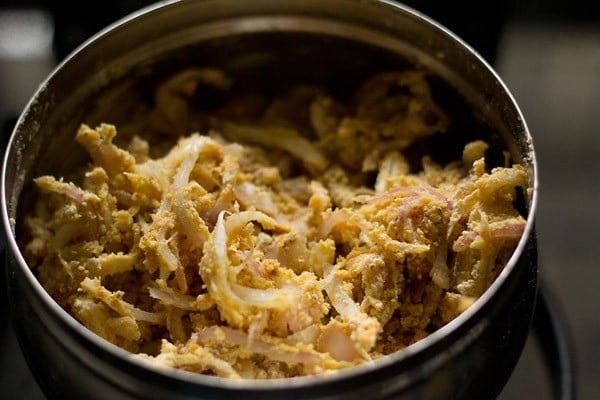
4. Then accordingly add water as required to make a thick batter. I added ¼ cup water. You can also skip adding water if the mixture is too moist.
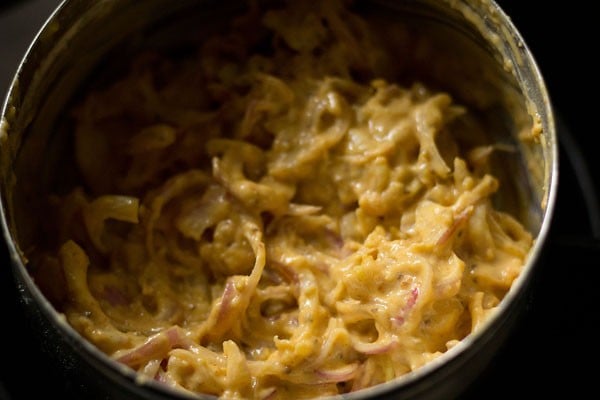
6. Heat oil for deep frying in a pan or kadai. You can use any neutral-flavored oil with a high smoking temperature or mustard oil.
When the oil becomes medium hot, with a spoon drop the pakora batter in the oil.
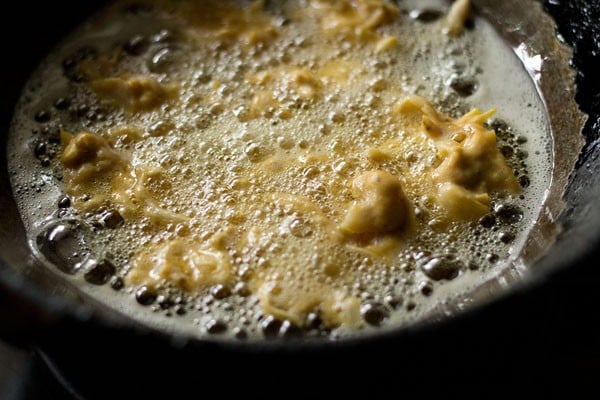
7. When the pakora are partly cooked, then turn over with a slotted spoon and continue to fry the other side.
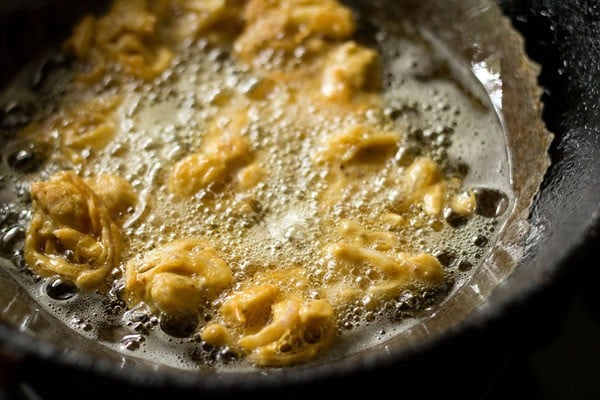
8. Fry till the pakora are crisp and golden turning over a couple of times for even cooking.
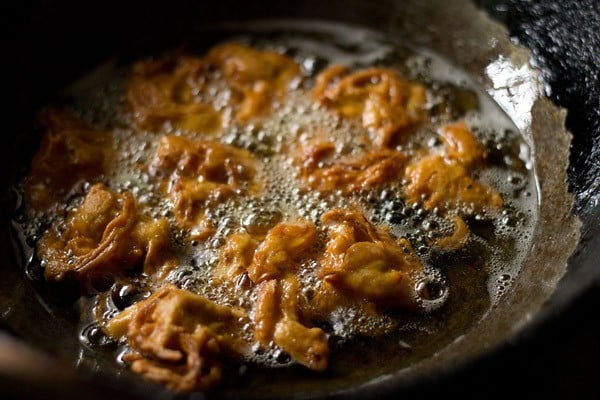
9. Remove the fried pakora and place them on a kitchen paper towel so that extra oil is absorbed. Fry the pakora in batches this way. When done keep all of them aside.
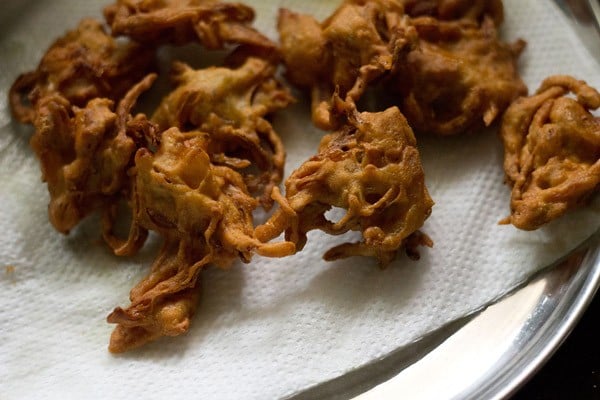
Make Kadhi Recipe
1. In another pan or kadai, heat 2 tablespoons of mustard oil. Make sure to use a large bottomed pot so that while cooking, the kadhi does not spill.
If you don’t have mustard oil, feel free to use any neutral-flavored oil. But the traditional Punjabi kadhi has mustard oil.
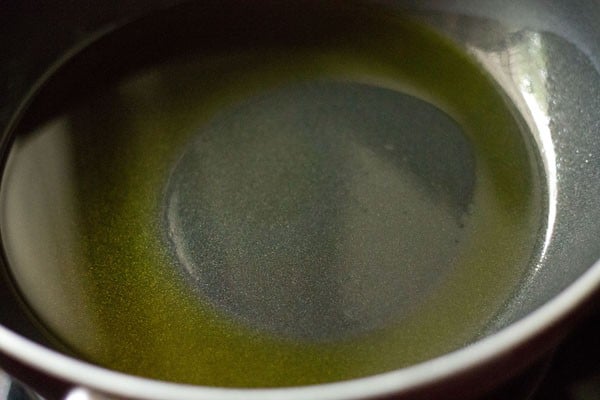
2. Add 1 teaspoon cumin seeds, 8 to 10 fenugreek seeds (methi seeds) and a generous pinch of asafoetida (hing).
Allow the cumin seeds to crackle and the fenugreek seeds to change their color. Fry on a low flame, so that these spices do not get burnt.
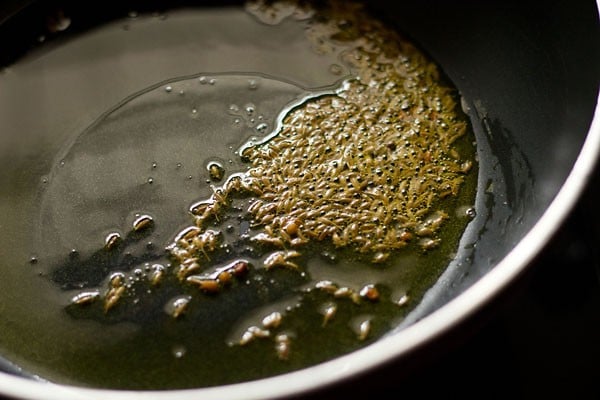
3. Add ⅓ cup chopped onions. Stir and saute for 3 minutes on low to medium-low heat.
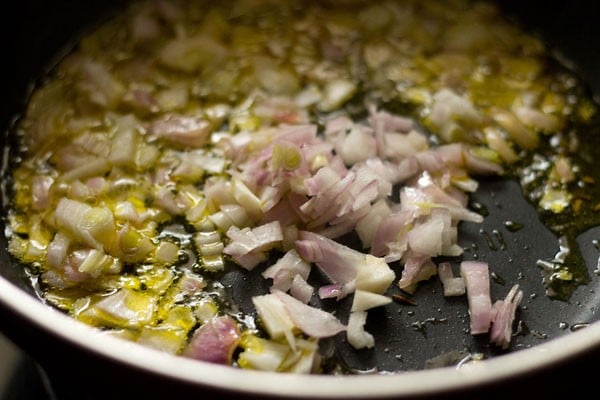
4. Then add 1 tablespoon chopped ginger, ¾ to 1 tablespoon chopped garlic and 2 green chillies, chopped. Stir and sauté for a minute.
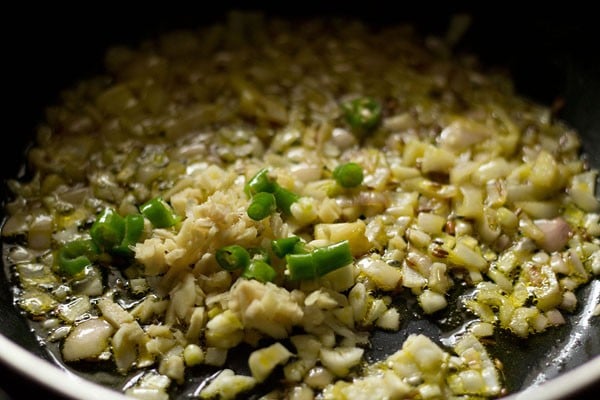
5. Now add 8 to 10 curry leaves, 2 dry red chilies (halved or broken).
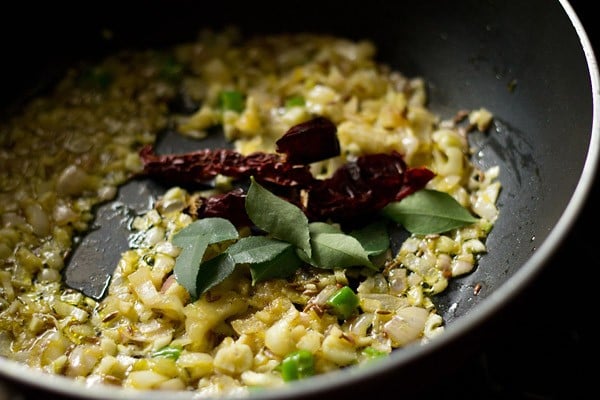
6. Stir and sauté for a minute on a low heat.
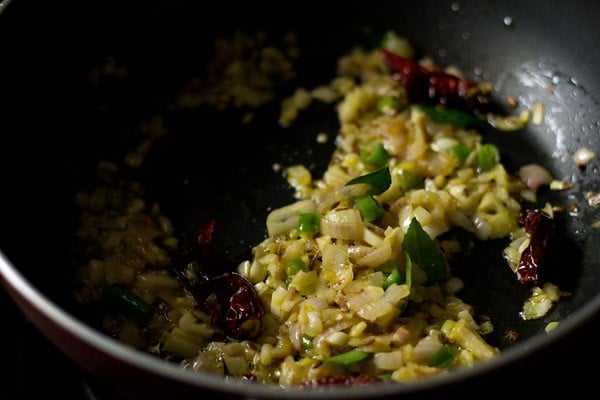
7. Then add the curd slurry.
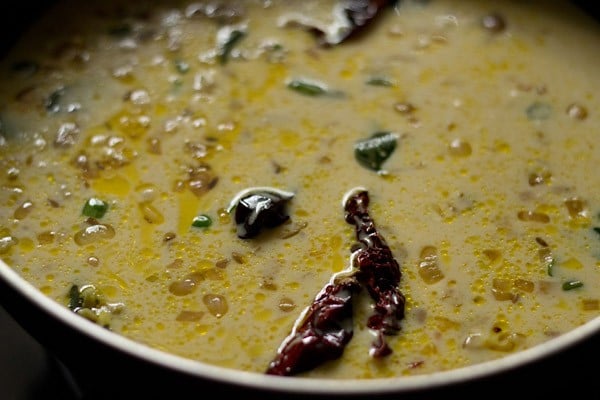
8. Stir very well.
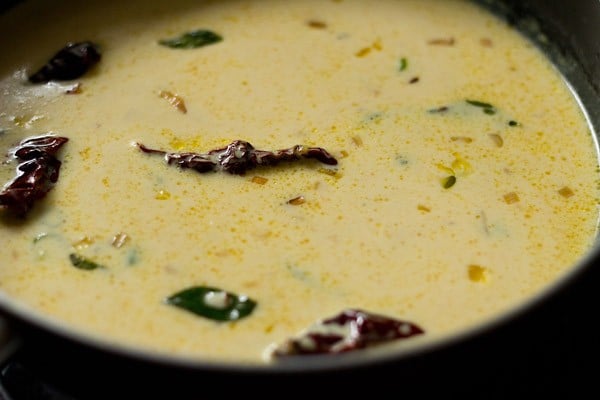
9. Increase the flame to medium and bring the kadhi to a boil. Keep on stirring often so that the bottom does not get browned. Time taken to cook kadhi will be around 14 to 16 minutes.
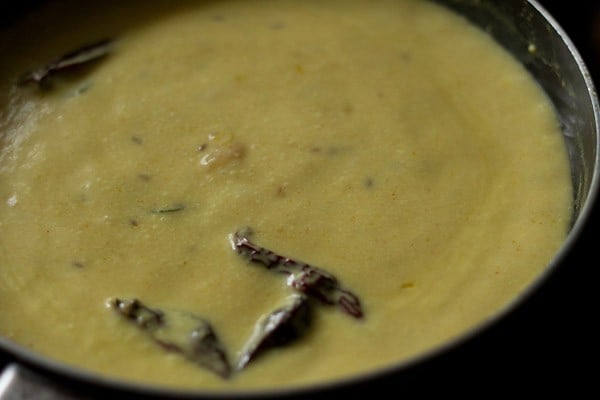
10. After it comes to a boil, then lower the heat and simmer it for a further 6 to 7 minutes. Do stir at times.
The kadhi will thicken as it cooks and simmers. If it becomes too thick, then add some hot water.
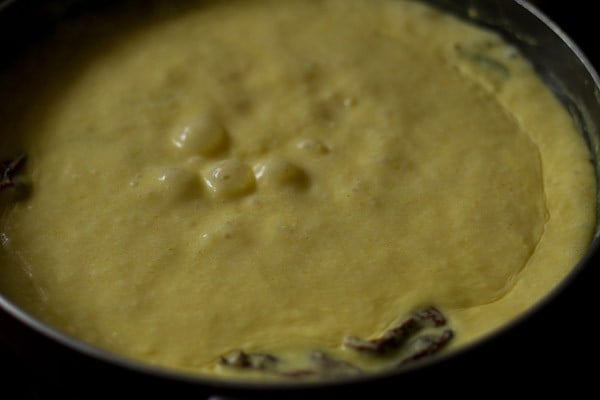
11. In the below photo, the kadhi is ready.
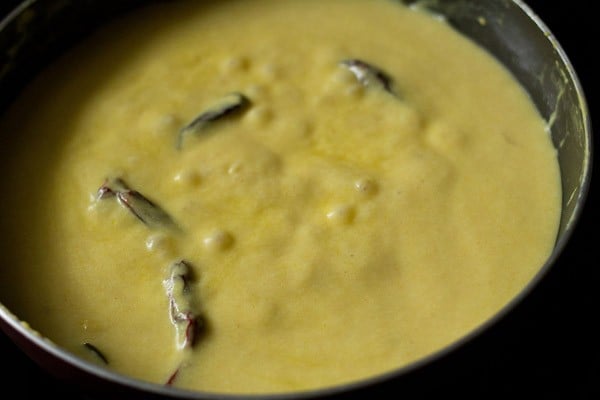
Make Kadhi Pakora
12. Now add the onion pakora to the kadhi. Stir gently.
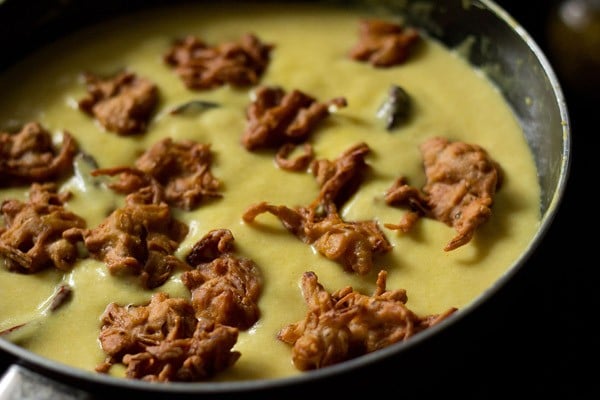
13. Cover with a lid and let the onion pakora be soaked in it for 8 to 10 minutes.
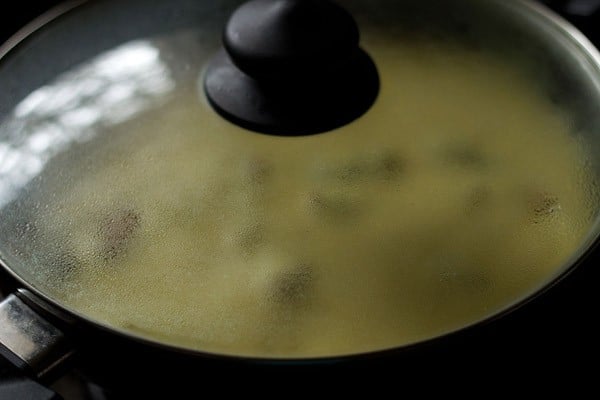
14. Lastly, sprinkle some garam masala powder on the Punjabi Kadhi.
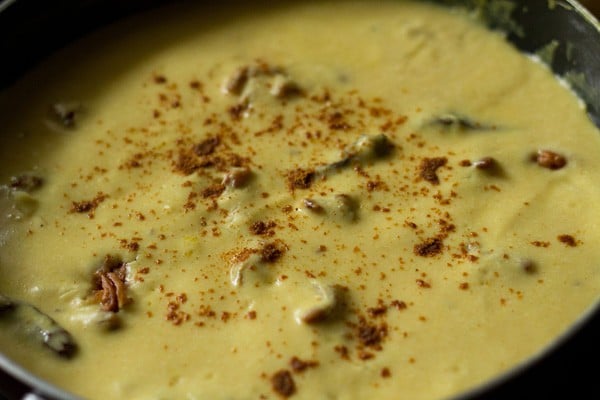
15. Garnish with coriander leaves and serve Punjabi Kadhi Pakora hot with steamed rice or jeera rice, topped with few teaspoonfuls of ghee.
You could also serve with roti or paratha. However, the combination of Kadhi Chawal (kadhi served with steamed rice) is very popular and tastes very good.
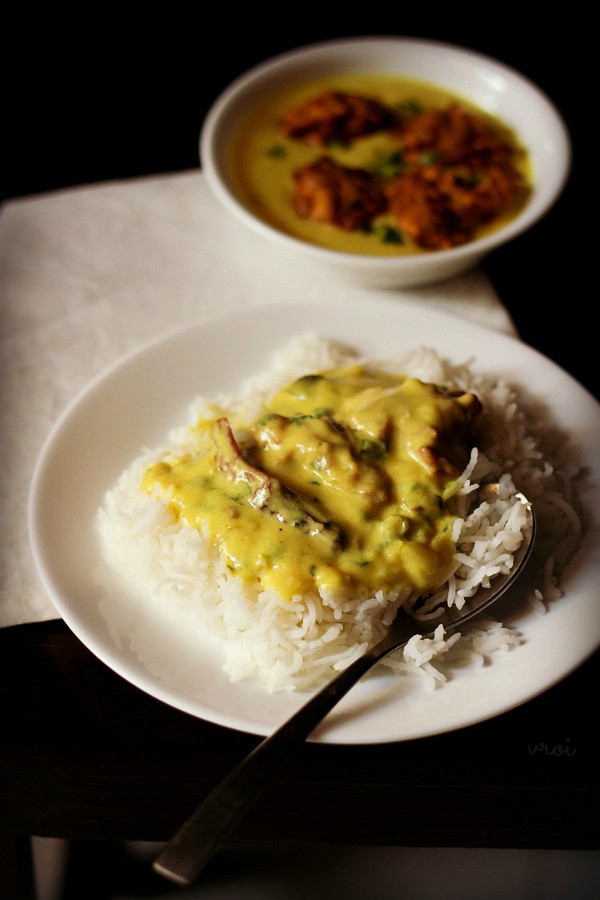
Expert Tips
- Curd (yogurt): Use full fat sour curd or sour yogurt made from whole milk. If the curd is not sour, then the kadhi will not be sour, but will still taste good. To make the curd sour, keep the set curd for a few hours at room temperature. Another way is to add ½ to 1 teaspoon amchur powder (dry mango powder) or a bit of lemon juice to the dish once its cooked.
- Fats: Use mustard oil if possible to fry the onion pakora and for tempering. Mustard oil lends a pungent sharp taste and flavor to the kadhi. If you do not have mustard oil, then use a neutral oil like sunflower oil.
- Baking Pakora: You could also bake the pakora instead of deep frying them. Bake in a preheated oven at 180 degrees Celsius until the pakora are crisp and golden. For baking pakora add 1 to 2 tablespoons oil in the batter and do not make the batter very moist but keep it a bit wet.
- Curry leaves: Don’t skip on curry leaves, as you will know that something is missing from the kadhi pakora recipe. But if they are not available to you then omit adding them.
- Besan: Use good quality gram flour (besan). In a pinch you could also use chickpea flour.
- Prep work: The onion pakora can be prepared earlier and set aside.
- Cooking kadhi: Use a large bottomed pot for making the kadhi pakora recipe. The kadhi froths while cooking, thus can overflow and spill if you use a small pot.
- Pakora texture: To make softer pakora, add some more water than mentioned in the recipe below. In this case, add the pakora to the kadhi, just before serving. If added much before serving, then the pakora become too soft and mushy.
Some folks do not like the mushy and soft pakora in the Punjabi kadhi. In this case the pakora can be a little hard. Add little or no water to the batter.
In this recipe I have not made the pakora soft. Just added enough water to make the batter smooth but not runny. Thus you could well add the pakora just after the kadhi is ready. The pakora won’t break when the kadhi is served later.
More Awesome Punjabi Recipes!
Paneer Recipes
Paneer Recipes
Dal (Lentils) & Legumes
Punjabi Food
Please be sure to rate the recipe in the recipe card or leave a comment below if you have made it. For more vegetarian inspirations, Sign Up for my emails or follow me on Instagram, Youtube, Facebook, Pinterest or Twitter.
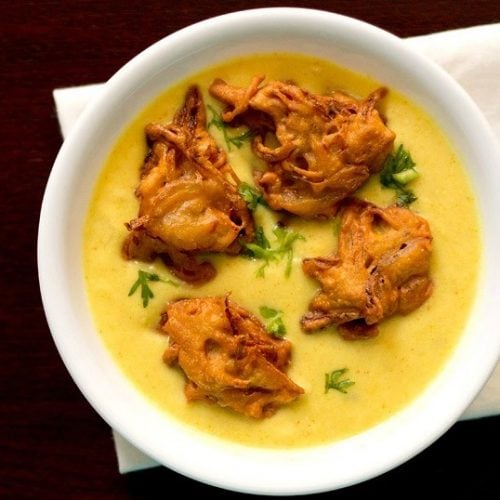
Kadhi Recipe (Punjabi Kadhi Pakora)
Ingredients
For curd slurry
- 1.5 cups sour curd (full fat) or sour yogurt, 375 grams
- 3 cups water or add as required
- ½ teaspoon red chilli powder or cayenne pepper
- ½ teaspoon turmeric powder (ground turmeric)
- ½ teaspoon Garam Masala
- 1 generous pinch asafoetida (hing)
- 1 to 1.5 teaspoon salt or add as required
- 8 tablespoon gram flour (besan), 40 grams
For onion pakora
- 1 cup thinly sliced onions (tightly packed) or 2 medium to large onions or 150 grams
- 1 cup besan (gram flour)
- ½ teaspoon red chilli powder
- ½ teaspoon Garam Masala
- ½ teaspoon carom seeds (ajwain)
- ⅔ to ¾ teaspoon salt or add as required
- ¼ cup water or add as required
- mustard oil or sunflower oil or any neutral oil – for shallow frying or deep frying
For kadhi
- ⅓ cup chopped onions or 1 small to medium onion
- 1 tablespoon chopped ginger
- ¾ to 1 tablespoon chopped garlic
- 8 to 10 fenugreek seeds (methi seeds)
- 2 green chillies – chopped or 1 teaspoon serrano peppers
- 2 dry red chillies – broken and seeds removed
- 1 teaspoon cumin seeds
- 1 generous pinch asafoetida (hing)
- 8 to 10 curry leaves or 1 sprig curry leaves
- 2 tablespoons mustard oil or sunflower oil or any neutral oil
Instructions
Making curd slurry
- In a bowl take the sour curd and whisk it well till smooth
- Add gram flour, red chilli powder, turmeric powder, garam masala powder and salt to the whisked curd.
- Stir and mix everything again.
- Add 3 cups water and stir again.
- Stir very well to make a smooth mixture without lumps. If there are lumps, then break them with a wired whisk or a spatula or with your fingers. Set the curd slurry aside.
- You can use a blender to make this mixture, but make sure you don’t over do it. You will get butter instead of a smooth blended curd.
Making pakora for kadhi
- Take the gram flour in a bowl and add carom seeds, red chili powder, garam masala powder and salt.
- Add 1 cup thinly sliced onions.
- Mix everything well and set aside covered for 30 minutes.
- This will allow the onions to release their water in the mixture. Depending on the water content in the onions, the mixture will become very moist or just about moist.
- Then accordingly add water as required to make a thick batter. I added ¼ cup water.
- Heat oil for deep frying in a pan or kadai. Let the oil become medium hot. Then with a spoon carefully drop the pakora batter in the oil.
- When the pakora are partly cooked, then turn over and fry the other side.
- Fry till the pakora are crisp and golden.
- Remove the fried pakora and place them on a kitchen paper towel so that extra oil is absorbed. Fry the pakora in batches this way. When done set all of them aside.
Making kadhi
- In another pan or kadai, heat mustard oil. Make sure to use a large bottomed pot so that while boiling, the kadhi does not spill.
- Add the cumin seeds, fenugreek seeds and asafoetida. Allow the cumin seeds to crackle and the fenugreek seeds to change their color. Fry on a low flame, so that these spices do not get burnt.
- Add chopped onions. Stir and sauté for 3 minutes on a low to medium-low heat.
- Then add chopped ginger, chopped garlic and chopped green chillies. Stir and sauté for a minute.
- Now add curry leaves, dry red chilies (halved or broken and seeds removed). Stir and sauté for a minute on a low flame.
- Then add the curd slurry.
- Stir very well.
- Increase the flame to medium and bring the kadhi to a boil. Keep on stirring often so that the bottom does not get browned. Time taken to cook kadhi will be around 14 to 16 minutes.
- After the kadhi has come to a boil, then lower the heat and simmer for more 6 to 7 minutes. The kadhi will thicken.
- If the kadhi becomes too thick, then add some hot water.
Making kadhi pakora
- Now add the onion pakora to the kadhi and stir gently.
- Cover with a lid and let the onion pakora be soaked in it for 8 to 10 minutes.
- Lastly sprinkle some garam masala powder.
- Serve kadhi pakora with steamed rice or cumin rice, topped with few teaspoonfuls of ghee. You could also have kadhi with roti or paratha.
Notes
- Curd (yogurt): For the kadhi recipe, use full fat sour curd or sour yogurt made from whole milk. If the curd is not sour, then the kadhi won’t be sour, but the taste will still be good. To make the curd sour keep the curd at room temperature for few hours. Second alternative is to add ½ to 1 teaspoon amchur powder (dry mango powder) or a bit of lemon juice when the dish is cooked.
- Fats: Use mustard oil if possible for deep frying onion pakora and for the kadhi. Mustard oil gives a pungent sharp taste and flavor. If you do not have mustard oil, then use a neutral oil like sunflower oil.
- Baking Pakora: You could also bake the pakora instead of frying them. Bake them in a preheated oven at 180 degrees celsius until the pakora are crisp and golden. For baking Add 1 to 2 tablespoons oil in the batter and do not make it very moist but keep it a bit wet and not dry.
- Curry leaves: Don’t skip on curry leaves, as you will know that something is missing from the kadhi pakora recipe. However if it is not available then skip adding them.
- Gram flour: Use good quality gram flour (besan). You could also use chickpea flour in place of gram flour.
- Prep work: The onion pakora can be made earlier and set aside.
- Cooking kadhi: Use a large bottomed pot for making the kadhi pakora recipe. The kadhi froths while cooking and can overflow if you use a small pot.
- Pakora texture: To make softer pakora, add some more water in the batter. In this case, add the pakora to the kadhi, just before serving. If added earlier to the kadhi, then the pakora become too soft and mushy. Some folks do not like mushy and soft pakora in the Punjabi kadhi. In this case the pakora can be a little hard – so add little or no water to the batter.
Nutrition Info (Approximate Values)
This Kadhi Recipe post from the blog archives first published in January 2012 has been updated and republished on July 2021.
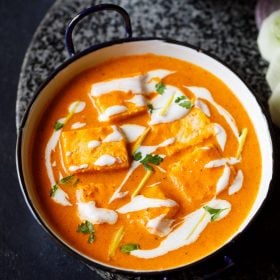
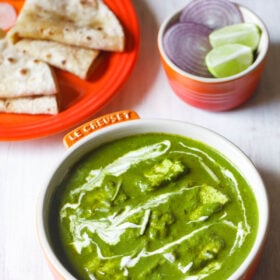
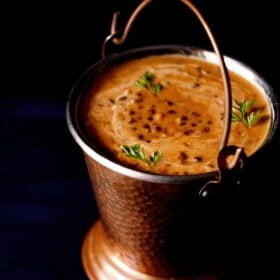
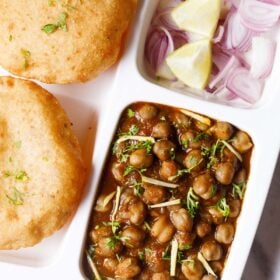








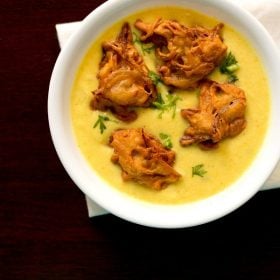
We make this at home regularly. Love it!
I just made this exactly as written (except for adding a lot more dried chillies) and this is fantastic.
It’s hard to get this dish at restaurants here in America (I found it once and it wasn’t very good) so it’s nice finding a recipe that’s authentic and fairly easy to make. Thanks!
Great and thanks for letting me know. Thanks also for the rating on the recipe.
Hello ! Thank you for sharing your recipes. Would like to enquire, can kadhi be freezed for later ? With the pakora freezed separately.
Welcome. Yes you can freeze the kadhi but freeze it without adding the pakoras. The pakoras can also be frozen but do warm them up in the oven or in an air-fryer before adding to the kadhi.
Absolutely delicious Recipe, 5 stars
Using your recipe of this curry for every day dinner. Super grateful !
Lovely and thank you.
Made it for my friend, it’s snowing here and we wanted comfort food. Absolutely delicious, loved the flavors and how easy it is! I swapped the pakoras for sautéed onions instead and used buttermilk instead of curd. Thanks Dassana.
Thank you for this feedback and the rating as well. Yes, sautéed onions also work well in the recipe. Most welcome.
Hi a quick question, are you supposed to eat the curry leaves ? Or do you remove them before serving ?
I added a ton of them and then wasn’t sure if I am supposed to take them out before serving this.
Curry leaves can be eaten. I eat them but not everyone prefers eating them. So you can remove them before serving. Curry leaves has many health benefits, so mostly I chop them while cooking, so that my family eats them.
Thanks so much for reply. I will cut the curry leaves small next time, so they can be eaten, great suggestion. I will be making this excellent recipe again soon !
Welcome and thanks.
Made vegan w/ vegan yogurt, good, thx !